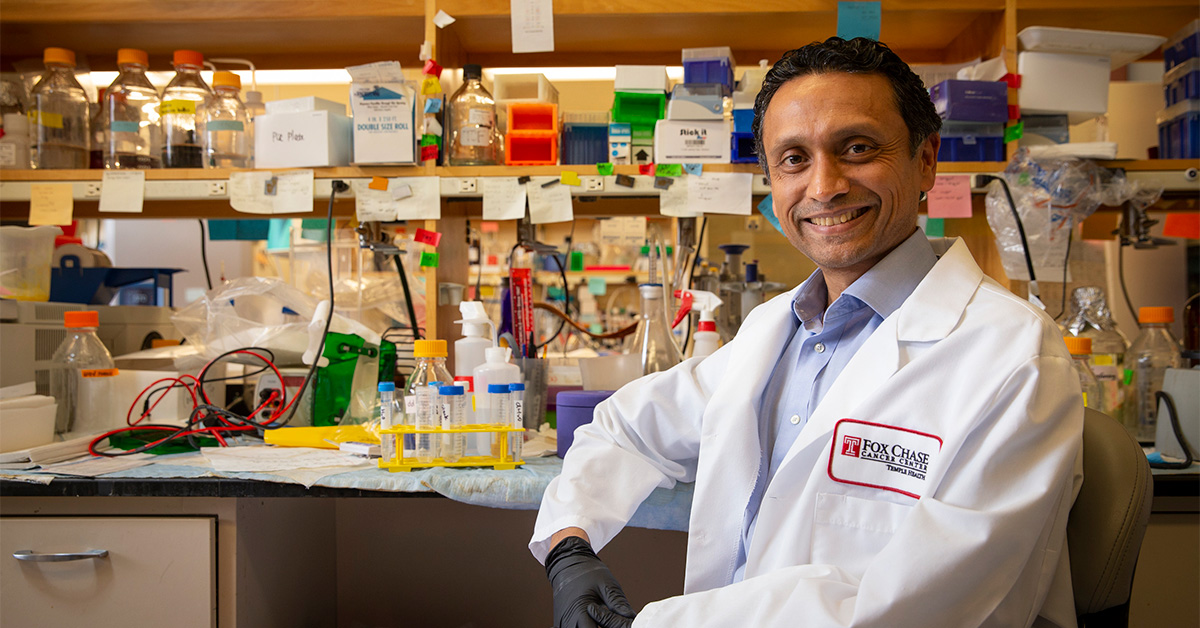
PHILADELPHIA (April 10, 2024) — In a study published today in the prestigious journal Nature, researchers from Fox Chase Cancer Center have shown that a newly developed compound was able to block necroptosis, a type of cell death that leads to lung inflammation and damage following infection with the influenza virus. Click HERE for study.
Necroptosis is triggered by the activation of the receptor interacting protein kinase 3 (RIPK3) pathway. This type of cell death produces strong immune responses by rupturing dead cells and releasing their contents throughout the body. When controlled, this form of cell death is effective at ridding the body of a virus. However, if unchecked, necroptosis can cause severe inflammation and lung damage and can even lead to death.
“We have now shown the possibility that RIPK3 can be inhibited, which is significant because it is central to programmed necrotic death in human tissues. Any disease involving chronic inflammation and necrotic death, such as colitis, lung fibrosis, liver disease, or psoriasis, could potentially benefit from blockade of this pathway,” said Siddharth Balachandran, PhD, lead author on the study and a Professor in the Cancer Signaling and Microenvironment Research Program at Fox Chase.
“We found that by blocking necroptosis, you don’t get this form of explosive death and its resultant inflammation,” added Balachandran, who is also one of the Basic Science Co-Leaders of the Center for Immunology at Fox Chase.
He and his colleagues used mice infected with the flu virus to show that a newly developed RIPK3 inhibitor called UH15-38 selectively blocked necroptosis and dampened inflammation even when administered later in the course of an infection, a milestone in viral infection research.
The new study comes on the heels of previous research in 2020 identifying a fundamental mechanism that detects the presence of the flu virus and rapidly destroys infected cells. In this research, Balachandran and colleagues identified a protein called ZBP1, which they later learned detects Z-RNA, a new form of RNA that is produced by the flu virus.
“When ZBP1 senses Z-RNA, it interprets this as a sign that the cell is infected and pushes an ‘auto-destruct’ button that not only kills the infected cell but also alerts the immune system to the presence of the virus,” said Balachandran.
This mechanism could have implications for a variety of fields, including immunotherapy in the treatment of cancer, which is currently ineffective for 70% to 80% of patients. In these cases, the immune system does not recognize the cancer as foreign.
Indeed, Balachandran’s work grows out of a long history of basic research at Fox Chase that can have unexpected applications in many areas of medicine. In 2022, he published another study in Nature that showed that a drug candidate may help reinitiate immune responses by mimicking influenza virus infections in patients whose cancer is unresponsive to immunotherapy.
As a result of that study, Fox Chase is currently conducting a phase 1 clinical trial in which a compound known as CBL0137 is used alongside immunotherapy drugs in melanoma patients to reactivate an immune response in tumors and rekindle immunotherapy effectiveness.
“It’s really important to study the body’s immune responses to pathogens so that we know how the immune system responds normally to what it’s meant to respond to. The majority of current cancer therapeutics have come from people studying normal cells and normal biology, and not the cancer cell itself,” Balachandran said.
“The immediate translational potential of this work is important. Without our prior research in the general areas of viral infections, we would not have discovered that viruses activate necroptosis and we therefore wouldn’t have been able to identify a compound that mimics virus infections and triggers on-demand necroptosis in tumors,” said Balachandran. “Basic research is fundamental to new drug discovery.”
Additionally, he noted the growing need for basic research in the area of viral infections. In the wake of the COVID-19 pandemic, it is more important than ever to search for solutions that focus on the body’s response to viruses rather than only working to develop new vaccines.
“The next pandemic could very well be from a new strain of the influenza virus, and there are no effective vaccines or therapeutics for influenza yet because targeting the virus is difficult,” said Balachandran.
“That’s the reason I think we need a therapy that targets the body’s response to the virus. This way you’re blocking a host pathology, so you don’t have to worry about resistance. That’s one of the major advantages of this study and why understanding how these biological processes work in normal settings is key to finding new anti-inflammatory and anticancer therapies.”